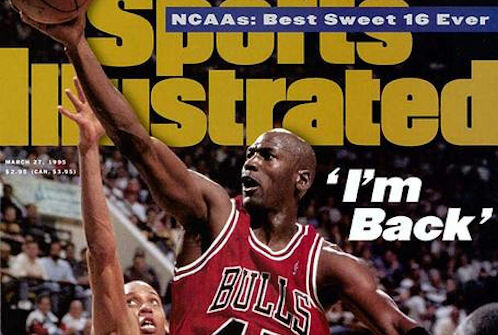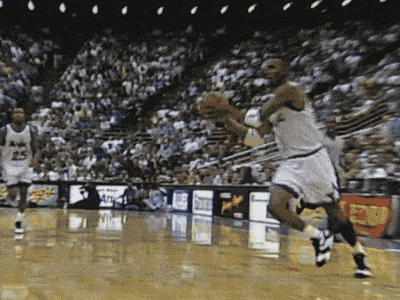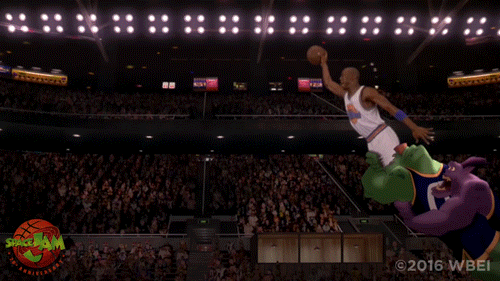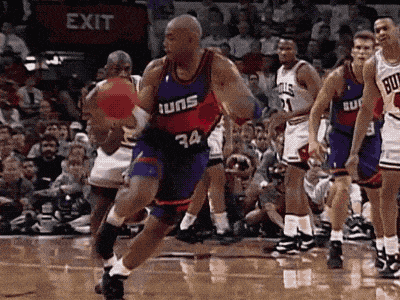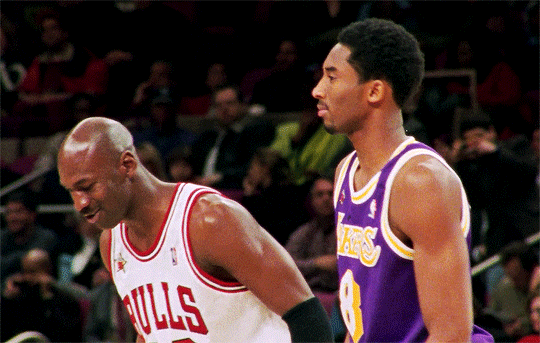“I’m back”
As baseball was put on indefinite hold, the NBA season moved forward. The Bulls, led by Scottie Pippen, were in striking distance of a return to their former glory. You know there was a part of Jordan that didn’t want Scottie to get all the shine of bringing the Bulls another title. Suddenly, you started getting Sportscenter nightly updates about how Jordan was seen at dinner with a former teammate, or how he’d crashed a Bulls practice session. The rumors started to grow, maybe MJ was going to un-retire and pick up where he left off.
Sure enough, he did return. And while he looked like the world’s best basketball player when he stepped back in the iconic red Bulls uniform, his game showed obvious rust. He’d been away for a year and a half concentrating on basketball after all. He looked human. And while it was fun to have him back, we were all left wondering if he would ever be the superhero we remembered him as.
Knocked out by Magic
Jordan was essentially returning to a post-Jordan version of the NBA. And the Orlando Magic were the rising team on everyone’s radar. They were powered by two of the leagues most dynamic personalities: Shaquille O’Neal and Penny Hardaway. It’s hard to remember now, but before injuries, Penny was a new kind of NBA beast. Long-armed and high flying. He was a point guard who could score on command. He and Shaq played the most entertaining brand of basketball in the league. Penny seemingly picked up right where Jordan left off. Even getting his own line of signature sneakers and iconic Nike commercials featuring a puppet version of him called Lil Penny. It was marketing gold. Penny kept winning and his sneakers became a cultural phenomenon.
In a post-Jordan first NBA retirement, Penny Hardaway was king.
So it was only fitting that Jordan would return to take on his heir apparent. But Orlando was at the height of their powers when they met the Bulls. Chicago was still trying to figure out how to work Jordan back into their system, and he was still trying to turn himself back into an unstoppable force. It was simply too soon. And the Magic ended up knocking the Bulls out and taking the Eastern Conference crown.
There is a lasting image of a defeated Jordan, at the end of the Bulls’ bench, looking across the court at the celebrating Orlando team. He looks sickened. He looks furious. And you can tell there is something brewing inside of him. In defeat, his fires had been rekindled. His reaction and commitment to coming all the way back would lead to an era of dominance even more impressive than the Bulls’ first three-peat. But for now, the off-season beckoned.
But more specifically, Intergalactic basketball playing monsters beckoned…
Space Jam
Man, those pickup games during the Space Jam filming must have been legendary. I love how Mike extended the invite for everyone to come out and play. It was like his test drive to see where everyone’s game was really out. The ultimate scouting mission. He wanted to get comfortable with everyone before he had to face them in battle again. And he was establishing himself as the king by calling everyone out to come and kiss the ring before his comeback fully kicked in.
And from an advertising and branding perspective, Space Jam was about 25 years ahead of its time. Talk about branded content. That’s the power of Michael Jordan and Nike to pull off a two hour shoe commercial disguised as a feature film. All based on an actual shoe spot from the year before. Talk about unstoppable branding power. I believe I can fly indeed!
Watching the best team of all time, live
I saw MJ and the Bulls play live during their mythic 72-10 season. They were in town to play the Portland Trailblazers and my Dad and I got tickets. Now I’d been to lots of games before and since then, but having MJ in the building was different. Even in a large space, even from the nosebleeds, you could feel his presence taking up the entire Rose Garden arena with its 22,000 person capacity. No one else had that kind of force with them.
We showed up early to the game, because hey, Jordan was in town and maybe we could catch an extra glimpse of him. Sure enough we did. Hours before the actual game, MJ was out there on the court by himself. Before there was any sort of crowd assembled. When there was just media and team staff milling about. But MJ was out there on the court, putting in work. This wasn’t the playoffs. Portland wasn’t even good at the time. This was a “meaningless” game in February. But Michael Jordan was the only player on the court, hours before tipoff, working on his game. This stuck with me.
This was his first year after his baseball exodus, and watching him warm up, you could feel that he wasn’t satisfied with his level. Specifically, he was working on his post up and signature fadeaway. The weapon that would come to define his second three-peat. I watched as he repeated the same moves, over and over and over again. He would flip the ball up in the air, and let it backspin into him, like he was simulating a pass from someone else. Then he’d catch it in a crouched position, and take a series of dribbles. One or two shoulder fakes later, he would rise up, floating backwards and release the shot with a perfect arch and backspin. At one point, someone on the Bulls’ staff came out and fed him some passes in the post. But mostly, it was just MJ on his own, in an empty stadium. I kept wondering, if Michael’s the best, how come the guys who aren’t as good weren’t out there putting in work? Oh, this is the difference I remembered thinking. It would inspire me to love practicing on my own before and after games, and learning to feel those extra repetitions paying off.
I was literally at this game. And now it’s a GIF. Maybe I’m one of the specks in the background.
Hours later the game started, and Jordan was electric. Even on a meaningless February game. The Bulls’ offense was perfectly spaced as they had become masters of Phil Jackson’s triangle offense. The ball constantly kept moving. Around the perimeter. In and out. Guys finding the open man. The Bulls moved like the ultimate well-oiled machine. And every two or three times down the court, Michael would end up in the post, in the exact spot he had been practicing before the game. The results were the same too. Picture perfect fadeaways over JR Rider, or whatever Trailblazer defender was trying to stop him that night. Jordan cruised to about 30 in the Bulls’ win. Every time he touched the ball, the arena charged up again. This is what we were paying for. Even in the 300-level, you could feel Jordan’s signature competitive spirit. As he chomped through his gum and the Portland defense. This was basketball on another plane. And we were all witnesses to one of the greatest seasons every put together in team sports.
Giving The Glove a slap in the face
Wow, this segment about the Bulls versus Sonics series in 1996 has already turned into a meme. When Jordan was wiggling his head and cackling at Gary Payton claiming he “slowed Mike down,” is already plastered over the internet. I mean, the Bulls did win the series, but Payton was defensive player of the year. And it’s also true that the Sonics won two games as soon as Payton started guarding Jordan. The stats actually show that Jordan’s numbers and shooting percentages went down. That was the narrative at the time soon. With the media criticizing Sonics’ coach George Karl for not having Payton guard Jordan earlier in the series. I don’t know what Jordan attributes his dip in production too. But hey, champions get to write their own history and end up on the winning side of all the memes.
Nevertheless, respect to Gary Payton and an additional shoutout to Shawn Kemp. Again, look at the YouTube highlights and Google Kemp’s stats. The guy actually made a case for being series MVP in a losing cause. He gave a gritty, iconic Finals performance.
